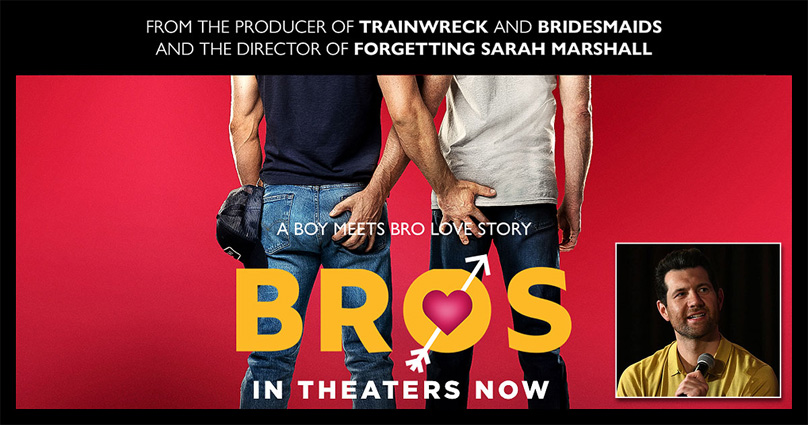Up until last year, I was a member of the Joint Diversity Council at Comcast, the parent company of Universal, which distributed the film “Bros.” While I was aware of the film in its early stages, I had no direct connection to it. But I was rooting for its success. When I saw the completed film last weekend, I loved it!!! It’s a great film with deserved rave reviews, and I strongly recommend it to all. But that is not what this is all about. This is about why a gay rom com film failed at the box office.
In response to the film’s lackluster ticket sales, the main star of “Bros,” Billy Eichner, tweeted: “That’s just the world we live in, unfortunately. Even with glowing reviews, great Rotten Tomatoes scores, an A CinemaScore etc, straight people, especially in certain parts of the country, just didn’t show up for Bros. And that’s disappointing but it is what it is.”
He then tweeted: “Everyone who ISN’T a homophobic weirdo should go see BROS tonight! You will have a blast! And it *is* special and uniquely powerful to see this particular story on a big screen, esp for queer folks who don’t get this opportunity often. I love this movie so much. GO BROS!!!”
Eichner is right in part about why the film failed commercially. But the main answer to why people didn’t see this historic film is even more simple. It wasn’t promoted to its base audience: LGBT people. And the promotion that was done in mainstream media actually made the film look like something other then a gay rom com. It was, in my view, a total failure of whoever staff member or whatever department at Universal was in charge of promoting the film.
The easy answer that some will take, including Eichner, is that there’s still a lot of homophobia out there. Maybe some people don’t want to even be seen entering a theater to see a gay rom com. But that’s a cop out answer, since whole families watch shows like “Modern Family” and “Will and Grace.”
“Bros” got lots of publicity in the weeks that led up to its release last Friday. It was shown on over 3,300 movie screens all over the nation. Such a wide release was expected of a major film backed by a major studio. That’s part of what the buzz was all about. The film was historic in the sense that it was/is the first major studio rom com that is about, written, directed, produced, and starred LGBT people. Billy Eichner appeared on national talk shows to promote the film.
Aside from homophobia, what could be the reason the film didn’t live up to expectations? Were there not enough LGBT people and their allies interested in it? Was it released in the wrong season? Did it need a bigger celebrity star? I think the answer is simpler than all those reasons: the publicity for “Bros,” a historic film for the LGBT community, was geared around mainstream press and media. Yep, you got that straight.
The advertising bought was not in LGBT media and the PR that was done was mostly with mainstream press. And much of that PR was about the historic nature of the film, not on its subject matter. In one interview it was said on TV that the historic nature of the film was the main talking point, not the storyline. At one point Eichner states “and it’s funny.” The marketing of the film got lost in both the outlets and in the message.
Why wouldn’t you advertise an historic LGBT film in LGBT media? It’s LGBT history month. Local LGBT media will be running articles on historic LGBT people and events for the next five weeks. Billy Eichner’s character in the film literally works for an LGBT museum. How many tie-ins does a marketing department need? Instead of a savvy campaign geared towards the film’s primary audience, Universal took the easy route and booked Eichner on Jimmy Kimmel.




